This spring I visited Josh Child‘s South End duplex for Stuff Magazine‘s “Drinks” issue. The article “Josh Childs shows how cocktail culture reaches beyond the bar” explores Josh’s fascination with the cocktail culture, especially from the 1920s through 1940s. Fittingly, Josh is co-owner of Silvertone Bar & Grill in Downtown Crossing as well as Trina’s Starlite Lounge, which will open later this summer in Inman Square.
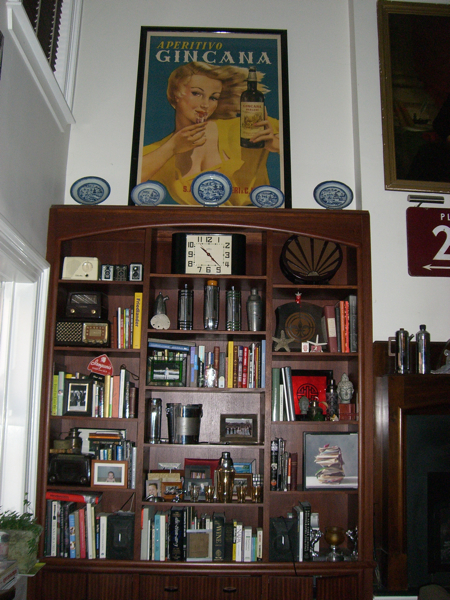 This is the focal point of the main living space, which is two stories high. (The entry is, interestingly, on the second floor mezzanine, which overlooks this space. The two bedrooms are also up there.) The bookshelves were custom built by self-taught millworker Mark Meritt, who also built the glass front kitchen cabinetry that holds the bar glasses.
This is the focal point of the main living space, which is two stories high. (The entry is, interestingly, on the second floor mezzanine, which overlooks this space. The two bedrooms are also up there.) The bookshelves were custom built by self-taught millworker Mark Meritt, who also built the glass front kitchen cabinetry that holds the bar glasses.
In addition to books and old photos, the shelves hold pieces from Josh’s collection of cocktail shakers and such. “I really like the 1930s cocktail shakers they started pumping out after Prohibition,” he said, as he showed me a chrome Art Deco cocktail shaker and champagne bucket from Chase, a well-known company based in Pittsburgh. He also has a soft spot for vintage Silvertone radios (a brand sold by Sears beginnign in the early 1920s). He’s simply unable to resist the round-edged design. The large original 1940s print for Gincana, an Italian aperitif, that sits on top is Josh’s favorite piece of artwork.
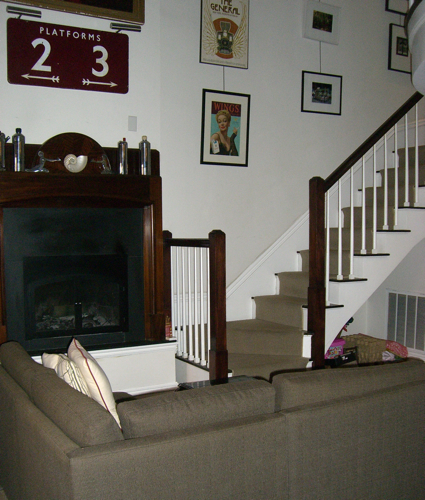 Here’s the fireplace next to the shelving, and the stairs going up to the second floor. There used to be a “Greg Brady firplace made from rocks.” This mantle is from the 20s. He pretty much gutted the condo when he purchased it in ’98 and reworked everything to look old. The London train station sign came from a Topsfield flea market.
Here’s the fireplace next to the shelving, and the stairs going up to the second floor. There used to be a “Greg Brady firplace made from rocks.” This mantle is from the 20s. He pretty much gutted the condo when he purchased it in ’98 and reworked everything to look old. The London train station sign came from a Topsfield flea market.
In the foreground is the simple West Elm modular sofa that makes up the living room seating area. Josh’s dad is an architect who worked at Skidmore, Owing and Merrill when Josh was growing up. They lived in a townhouse in Georgetown in D.C. Josh says, “Everything was streamlined and chrome. The joke was that the architects all had outdoor furniture inside. It was pretty spare; not a lot of carpets. I guess it influenced me more than I realized
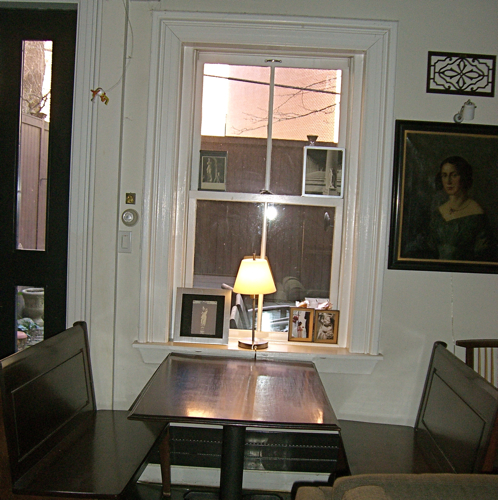 Josh had this booth made for the space by the guy who built the stairs and railing.
Josh had this booth made for the space by the guy who built the stairs and railing.
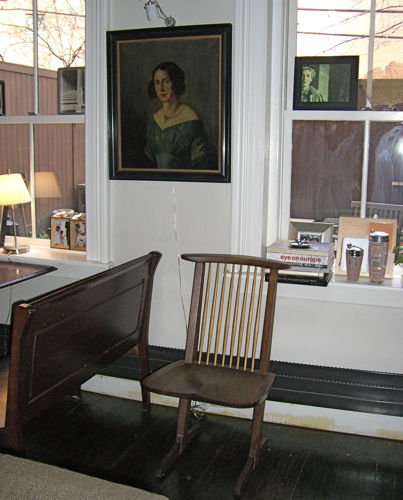 The chair is an authentic, signed George Nakashima handed down from his great aunt. The portriat is a great, great grandmother. Josh has a few ancestral oils because nobody else in his family ever wants them. He says, “I am where the family’s castoffs go.” On mixing such a variety of styles he says, “What happens in small living spaces you put up everything. If I had house, I’d have it all in one room, like a library with leather couches. But I think it’s OK to mix eras; it’s all just stuff that I like.”
The chair is an authentic, signed George Nakashima handed down from his great aunt. The portriat is a great, great grandmother. Josh has a few ancestral oils because nobody else in his family ever wants them. He says, “I am where the family’s castoffs go.” On mixing such a variety of styles he says, “What happens in small living spaces you put up everything. If I had house, I’d have it all in one room, like a library with leather couches. But I think it’s OK to mix eras; it’s all just stuff that I like.”
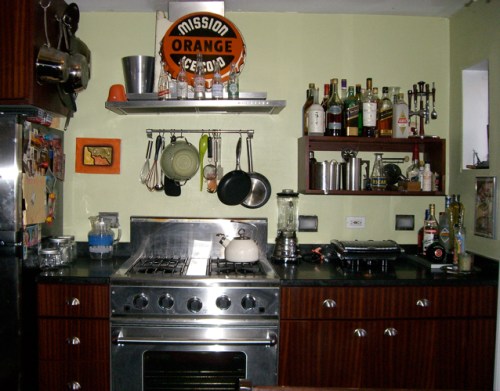 You can tell this kitchen is really used, by the abundance of pots and utensils. It’s a little cluttered and definitely homey, but has a good sense of masculine design.
You can tell this kitchen is really used, by the abundance of pots and utensils. It’s a little cluttered and definitely homey, but has a good sense of masculine design.
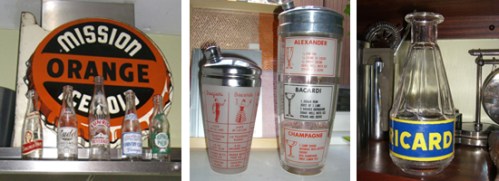 Close-ups of some pieces in Josh’s collection. He found the Ricard bottle on Etsy. Have you seen “Julie and Julia” yet? There’s one in a Parisian restaurant scene. Josh doesn’t do the Ebay thing much. Most of these things came antique stores, including the Cambridge Antique Market.
Close-ups of some pieces in Josh’s collection. He found the Ricard bottle on Etsy. Have you seen “Julie and Julia” yet? There’s one in a Parisian restaurant scene. Josh doesn’t do the Ebay thing much. Most of these things came antique stores, including the Cambridge Antique Market.
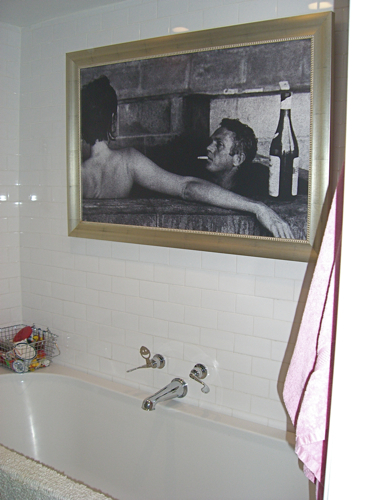 Don’t you love that there’s art hanging in the tub? Josh had the image blown up at Kinko’s on waterproof vinyl, then had it framed.
Don’t you love that there’s art hanging in the tub? Josh had the image blown up at Kinko’s on waterproof vinyl, then had it framed.
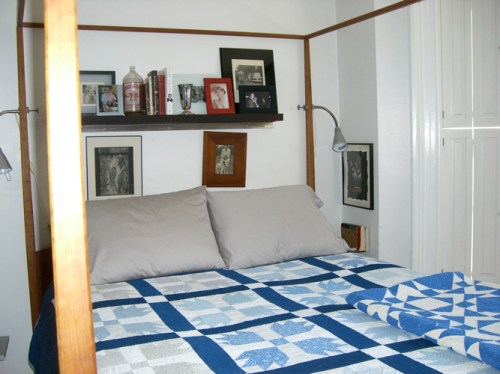 Even the bedroom has vintage bottles sitting among the old black & white family photos. He added the shutters to the windows. The smaller quilt is handmade.
Even the bedroom has vintage bottles sitting among the old black & white family photos. He added the shutters to the windows. The smaller quilt is handmade.
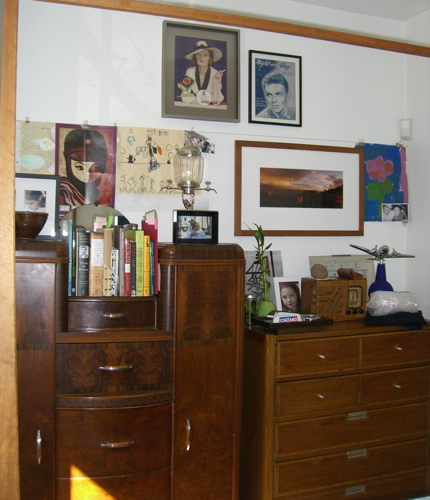 Here are the dressers opposite the bed. The tall one was part of a set of a double bed and vanity dresser but two friends took the other pieces. It has Bakelite pulls. The other dresser is more ’60s early ’70s, from a flea market to which he added new pulls.
Here are the dressers opposite the bed. The tall one was part of a set of a double bed and vanity dresser but two friends took the other pieces. It has Bakelite pulls. The other dresser is more ’60s early ’70s, from a flea market to which he added new pulls.
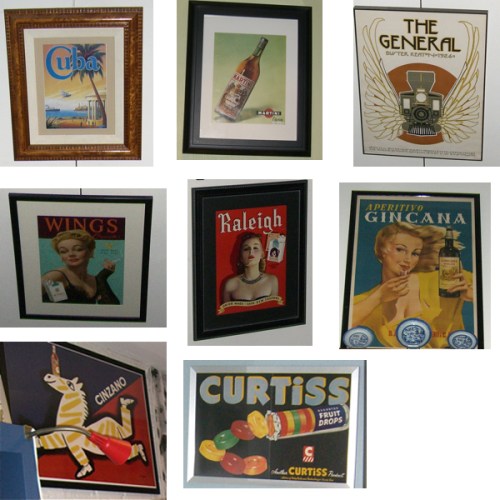 Josh collects vintage posters and magazines, which are scattered throughout the condo. His bar, Silvertone, is similarly adorned. Josh says, “The imagery on the walls are ’20s and ’40s cocktail advertisements, often torn from LIFE magazine. People would bring in photos from that period too. They’d say, ‘I have a great old picture of my father in the ’40s’ so I have them made a copy and we’d put it on the wall. It took about 5 or 6 years before it was finished.”
Josh collects vintage posters and magazines, which are scattered throughout the condo. His bar, Silvertone, is similarly adorned. Josh says, “The imagery on the walls are ’20s and ’40s cocktail advertisements, often torn from LIFE magazine. People would bring in photos from that period too. They’d say, ‘I have a great old picture of my father in the ’40s’ so I have them made a copy and we’d put it on the wall. It took about 5 or 6 years before it was finished.”

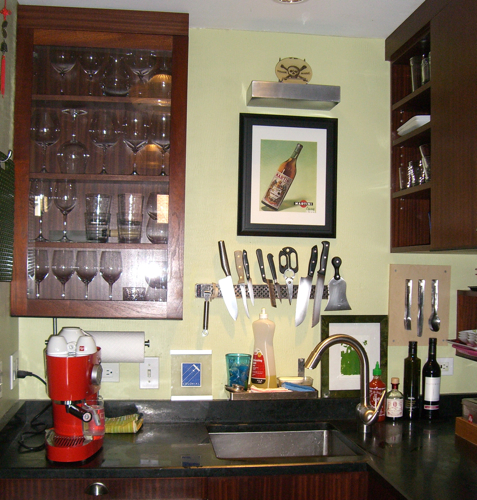

 Follow StyleCarrot on Twitter
Follow StyleCarrot on Twitter
